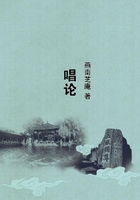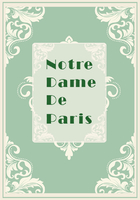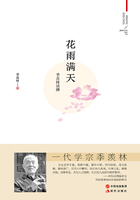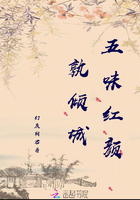Till the rising of the sun, When the merry larks do sing, And each lad did rise and take his lass, And away to hay-making.
Ballad: THE SWORD-DANCERS' SONG.
[SWORD-DANCING is not so common in the North of England as it was a few years ago; but a troop of rustic practitioners of the art may still be occasionally met with at Christmas time, in some of the most secluded of the Yorkshire dales. The following is a copy of the introductory song, as it used to be sung by the Wharfdale sword-dancers. It has been transcribed from a MS. in the possession of Mr. Holmes, surgeon, at Grassington, in Craven. At the conclusion of the song a dance ensues, and sometimes a rustic drama is performed. See post, p. 175. JUMPING JOAN, alluded to in the last verse, is a well-known old country dance tune.]
THE SPECTATORS BEING ASSEMBLED, THE CLOWN ENTERS, AND AFTER DRAWINGA CIRCLE WITH HIS SWORD, WALKS ROUND IT, AND CALLS IN THE ACTORS INTHE FOLLOWING LINES, WHICH ARE SUNG TO THE ACCOMPANIMENT OF AVIOLIN PLAYED OUTSIDE, OR BEHIND THE DOOR.
THE first that enters on the floor, His name is Captain Brown;I think he is as smart a youth As any in this town:
In courting of the ladies gay, He fixes his delight;He will not stay from them all day, And is with them all the night.
The next's a tailor by his trade, Called Obadiah Trim;You may quickly guess, by his plain dress, And hat of broadest brim, That he is of the Quaking sect, Who would seem to act by merit Of yeas and nays, and hums and hahs, And motions of the spirit.
The next that enters on the floor, He is a foppish knight;The first to be in modish dress, He studies day and night.
Observe his habit round about, -
Even from top to toe;
The fashion late from France was brought, -He's finer than a beau!
Next I present unto your view A very worthy man;He is a vintner, by his trade, And Love-ale is his name.
If gentlemen propose a glass, He seldom says 'em nay, But does always think it's right to drink, While other people pay.
The next that enters on the floor, It is my beauteous dame;Most dearly I do her adore, And Bridget is her name.
At needlework she does excel All that e'er learnt to sew, And when I choose, she'll ne'er refuse, What I command her do.
And I myself am come long since, And Thomas is my name;Though some are pleased to call me Tom, I think they're much to blame:
Folks should not use their betters thus, But I value it not a groat, Though the tailors, too, that botching crew, Have patched it on my coat.
I pray who's this we've met with here, That tickles his trunk wame? We've picked him up as here we came, And cannot learn his name:
But sooner than he's go without, I'll call him my son Tom;And if he'll play, be it night or day, We'll dance you JUMPING JOAN.
Ballad: THE SWORD-DANCERS' SONG AND INTERLUDE. AS NOW PERFORMED ATCHRISTMAS, IN THE COUNTY OF DURHAM.
[THE late Sir Cuthbert Sharp remarks, that 'It is still the practice during the Christmas holidays for companies of fifteen to perform a sort of play or dance, accompanied by song or music.'
The following version of the song, or interlude, has been transcribed from Sir C. Sharp's BISHOPRICK GARLAND, corrected by collation with a MS. copy recently remitted to the editor by a countryman of Durham. The Devonshire peasants have a version almost identical with this, but laths are used instead of swords, and a few different characters are introduced to suit the locality.
The pageant called THE FOOL PLOUGH, which consists of a number of sword-dancers dragging a plough with music, was anciently observed in the North of England, not only at Christmas time, but also in the beginning of Lent. Wallis thinks that the SWORD DANCE is the antic dance, or chorus armatus of the Romans. Brand supposes that it is a composition made up of the gleaning of several obsolete customs anciently followed in England and other countries. The Germans still practise the SWORD DANCE at Christmas and Easter. We once witnessed a SWORD DANCE in the Eifel mountains, which closely resembled our own, but no interlude, or drama, was performed.]
ENTER DANCERS, DECORATED WITH SWORDS AND RIBBONS; THE CAPTAIN OFTHE BAND WEARING A COCKED HAT AND A PEACOCK'S FEATHER IN IT BY WAYOF COCKADE, AND THE CLOWN, OR 'BESSY,' WHO ACTS AS TREASURER, BEINGDECORATED WITH A HAIRY CAP AND A FOX'S BRUSH DEPENDENT.
THE CAPTAIN FORMS WITH HIS SWORD A CIRCLE, AROUND WHICH WALKS.
THE BESSY OPENS THE PROCEEDINGS BY SINGING -GOOD gentlemen all, to our captain take heed, And hear what he's got for to sing;He's lived among music these forty long year, And drunk of the elegant spring.
THE CAPTAIN THEN PROCEEDS AS FOLLOWS, HIS SONG BEING ACCOMPANIED BYA VIOLIN, GENERALLY PLAYED BY THE BESSY -Six actors I have brought Who were ne'er on a stage before;But they will do their best, And they can do no more.
The first that I call in He is a squire's son;He's like to lose his sweetheart Because he is too young.
But though he is too young, He has money for to rove, And he will spend it all Before he'll lose his love.
CHORUS. FAL LAL DE RAL, LAL DE DAL, FAL LAL DE RA RAL DA.
FOLLOWED BY A SYMPHONY ON THE FIDDLE, DURING WHICH THE INTRODUCEDACTOR WALKS ROUND THE CIRCLE.
THE CAPTAIN PROCEEDS -
The next that I call in He is a tailor fine;What think you of his work?
He made this coat of mine!
HERE THE CAPTAIN TURNS ROUND AND EXHIBITS HIS COAT, WHICH, OFCOURSE, IS RAGGED, AND FULL OF HOLES.
So comes good master Snip, His best respects to pay:
He joins us in our trip To drive dull care away.
CHORUS AND SYMPHONY AS ABOVE.
HERE THE TAILOR WALKS ROUND, ACCOMPANIED BY THE SQUIRE'S SON. THISFORM IS OBSERVED AFTER EACH SUBSEQUENT INTRODUCTION, ALL THE NEWCOMERS TAKING APART.
The next I do call in, The prodigal son is he;By spending of his gold He's come to poverty.
But though he all has spent, Again he'll wield the plow, And sing right merrily As any of us now. Next comes a skipper bold, He'll do his part right weel -A clever blade I'm told As ever pozed a keel.
He is a bonny lad, As you must understand;It's he can dance on deck, And you'll see him dance on land.















